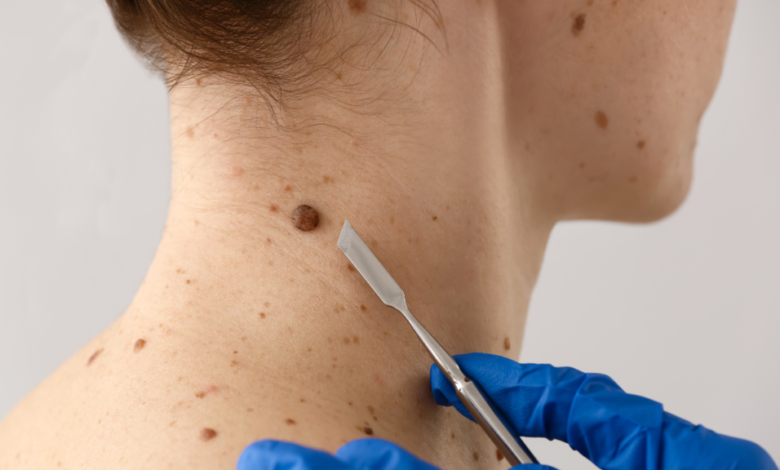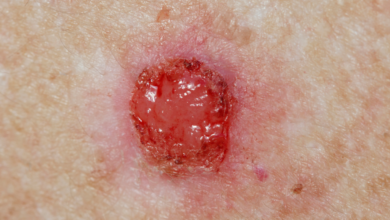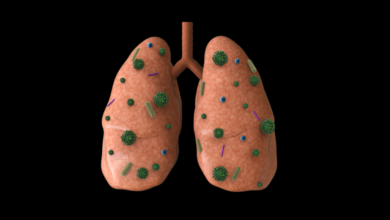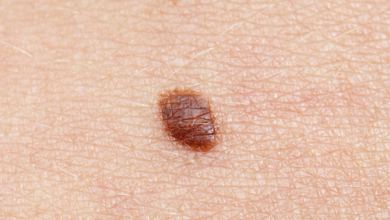Skin Cancer: A Common Type of Cancer
Skin Cancer: A Comprehensive Guide to Types, Symptoms, and Treatment

What is Skin Cancer?
Skin cancer is a disease in which malignant (cancerous) cells form in the tissues of the skin.
Types of Skin Cancer
There are three main types of skin cancer:
- Basal Cell Carcinoma: The most common type of skin cancer, it typically develops on sun-exposed areas of the skin.
- Squamous Cell Carcinoma: This type of skin cancer is more aggressive than basal cell carcinoma and can spread to other parts of the body if left untreated.
- Melanoma: A serious form of skin cancer that can spread quickly to other parts of the body.
Symptoms of Skin Cancer
Early-stage skin cancer may not cause any noticeable symptoms. However, as the cancer progresses, symptoms may include:
• A new, unusual-looking growth on the skin
• A sore that doesn’t heal
• A change in the size, shape, or color of an existing mole
• A mole that bleeds, itches, or crusts
Causes of Skin Cancer
The primary cause of skin cancer is excessive exposure to ultraviolet (UV) radiation from the sun. Other factors that can increase the risk of skin cancer include:
• Fair skin: People with fair skin, light hair, and light eyes are more susceptible to skin cancer.
• Family history of skin cancer: A family history of skin cancer can increase the risk.
• Weakened immune system: A weakened immune system can make it harder for the body to fight off skin cancer.
Who Can Suffer from Skin Cancer?
Anyone can develop skin cancer, but people with fair skin, light hair, and light eyes are at higher risk.
Diagnostic Tests for Skin Cancer
To diagnose skin cancer, a doctor may use a combination of tests, including:
• Physical exam: A visual examination of the skin to check for any suspicious moles or growths.
• Biopsy: A small tissue sample is removed and examined under a microscope to confirm the diagnosis.
Stages of Skin Cancer
The staging of skin cancer helps determine the extent of the disease and guides treatment decisions. The most common staging system for melanoma is the TNM system, which considers the size of the tumor (T), the spread to nearby lymph nodes (N), and the presence of distant metastases (M).
Treatment of Skin Cancer
The treatment for skin cancer depends on the type, stage, and location of the cancer. Common treatment options include:
• Surgery: To remove the cancerous tumor and surrounding tissue.
• Mohs surgery: A specialized surgical technique to remove the cancer layer by layer.
• Cryotherapy: To freeze and destroy the cancer cells.
• Laser therapy: To destroy the cancer cells with a laser.
• Topical medications: To treat certain types of skin cancer.
• Radiation therapy: To kill cancer cells with high-energy rays.
• Chemotherapy: To kill cancer cells throughout the body.
• Immunotherapy: To boost the body’s immune system to fight cancer cells.
Diet and Skin Cancer Prevention
While a specific diet cannot guarantee prevention of skin cancer, a healthy diet can contribute to overall health and potentially reduce the risk of certain skin conditions. Here are some dietary recommendations:
• A balanced diet: A diet rich in fruits, vegetables, and whole grains can provide essential nutrients and antioxidants.
• Limit processed foods and sugary drinks: These can contribute to inflammation and other health issues.
• Maintain a healthy weight: Obesity can increase the risk of certain health conditions, including skin cancer.
Overall Survival Rate of Skin Cancer
The overall survival rate for skin cancer varies depending on the type of skin cancer, the stage of the cancer, and the individual’s overall health. Early detection and timely treatment significantly improve the prognosis.
Doctor to Consult
A dermatologist is the best doctor to consult for skin cancer.
Diseases Associated with Skin Cancer
Skin cancer is primarily associated with excessive sun exposure. However, certain genetic conditions, such as xeroderma pigmentosum, can increase the risk of skin cancer.
How to Prevent Skin Cancer
To prevent skin cancer, consider the following:
• Limit sun exposure: Minimize sun exposure, especially during peak hours.
• Use sunscreen: Apply broad-spectrum sunscreen with an SPF of 30 or higher.
• Wear protective clothing: Wear hats, sunglasses, and long-sleeved clothing to protect your skin from the sun.
• Avoid tanning beds: Tanning beds emit harmful UV radiation.
• Regular skin self-exams: Check your skin regularly for any changes, such as new moles or changes in existing moles.
• Regular skin exams: Schedule regular skin exams with a dermatologist.





